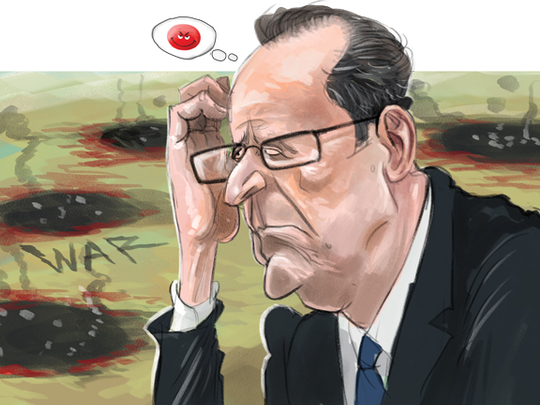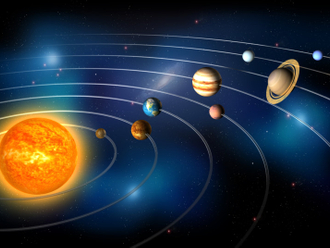
Much has changed in France in the last decade. The country that was once united in opposition of US military adventurism in the Middle East is now falling in the trap of its own military adventurism and abstract wars on extremism and terrorism.
Shortly after an attack in Paris by French-born and raised militants, the menace of ‘Islamic extremism’ once more resurfaced. Few seem to be asking the right questions: About France’s own responsibility in engendering militarism in the Middle East and Africa, specifically its deadly missions in Mali and Libya, and also its sinister role in Syria. Few are questioning poverty and alienation that is felt by large swathes of French society, especially those of immigrants and their descendants.
Instead, the deadly attacks, resulting in the murder of 17 people, became a subject of discussion about freedom of expression, however sadistic, insensitive and degrading it may be.
French President Francois Hollande found in the killings a political opportunity unmatched. He led nearly 40 world leaders, many of whom with terrible human rights records, in a solidarity march in Paris in January 11. Expectedly, his poor record among voters received a boost, in fact a historic one. His approval rating jumped by 21 points, to 40 per cent according to polling agency Ifop.
“The increase in Francois Hollande’s popularity is not like one we have seen before,” according to Damien Philippot, director of political studies at Ifop, “In gaining 21 points in the Ifop poll [he] ... broke a record previously held by President Francois Mitterrand, who gained 19 points the day after the start of the war in Iraq in 1991.”
Both jumps in rating is violence related, a sad commentary of its own.
But Hollande was never a popular president, and he is unlikely to maintain his number. No matter how hard the ‘socialist’ leader tries to impress, there never seems to be a solid constituency that backs him. He attempted to mask his initial lack of experience in foreign affairs with a war in Mali, after his country enthusiastically took on Libya. While he succeeded at launching wars, he failed at managing their consequences as the latest attacks in Paris have demonstrated.
Following the attack on satirical magazine Charlie Hebdo, he is attempting to ride a wave of popularity among his countrymen, who also protested in their millions on January 11. In the midst of it all, the embattled Hollande was at centre stage, ready to act as a statesman, decisive leader, and father of a nation. And as his nation tried to come to terms with the tragedy, Hollande made his annual new year’s address, promising to escalate the exact same policies that engendered violence and what many western pundits readily refer to as ‘Islamic terrorism’.
“If we can combat terrorism in Iraq, just as we did in Africa, we are ensuring our own security,” he said. His plan sounded as pathetic as all familiar: “If necessary we will be able to act in Iraq with more intensity and more efficacy; the aircraft carrier will be working in very narrow communication with the other forces and will be able to attack in any point in the event of supplementary tensions,” he said.
As if nothing has been learnt until now, Hollande seems to be borrowing the same costly policies that were implemented by former US president George W. Bush after the deadly attacks of September 11. He too struck violently and thoughtlessly and at the urging of powerful neoconservative groups; he carried out pre-conceived policies to assure America’s dominance in the name of fighting ‘terror’. These policies backfired, none of the US strategic objectives were achieved, and the ‘New Middle East’ which the US administration so desperately coveted, became a breeding ground for the same ‘terrorism’ that the Americans allegedly fought.
Prior to Bush’s misadventures in the Middle East, Al Qaida seemed to have been a distant reality that had been heard of, but unseen. A decade after the US invasion of Iraq, Al Qaida penetrated the Middle East and North Africa, hatching into numerous groups, sub-groups and Al Qaida-inspired groups. In fact, Al Qaida-turned-Daesh (Islamic state of Iraq and the Levant) is now redefining borders, carving a ‘state’ of its own that occupies massive swathes of land in Syria and Iraq.
But why is Hollande repeating the failed policies of the discredited Bush administration and reversing the principled and sound choices of former French presidents, like Jacques Chirac? Foreseeing its potential disasters, Chirac stood defiantly against Bush’s war in Iraq; and he is still right. But since then, France itself has changed, and failed leaders like Nicolas Sarkozy, and now Hollande are responsible for that change.
When Hollande was elected in May 2012, some saw hope in him during times of economic crises, high unemployment, political disunity, and a collective feeling of loss and confusion; yet he failed to deliver. The economy stalled despite his promises to kickstart it. Unemployment lingered and even the proposed higher taxes on the country’s millionaires were not delivered.
However, this is not just a question of economic recession. The rise of racism, ensured by the rise of right-wing and fascist parties, is devouring France’s sense of national identity. Naturally, Hollande’s failures translated into bad numbers. His approval rating quickly dropped, so in order to save the day, he decided to do the exact opposite of what he had been elected to do: Go to war.
His decision on January 11, 2013, to bomb “Islamic militants” scantly won him a reputation of being a “decisive president”. But wars are easy to start and difficult to finish. Hollande’s wars are no exception.
The war in Mali had little to do with religious militancy and everything to do with the existing chasm in the country itself, and the region as a whole. By adding western wars and intervention to the mix, calamity is assured.
With the US expanding its military presence in Africa, China its economic reach and regional powers jockeying for influence, it was Hollande’s perfect movement to appear as if a great French leader was redeeming his country’s old colonial ‘glory’ in Africa. Mali was the ideal place for Hollande to distract the world from his failures at home. The West African country, once a promising democracy, had become a failed state, with a host of problems, ethnic and racial divides and a countless stream of weapons coming in from Libya — itself destroyed by western powers, starting with France.
Hollande’s moment of glory arrived on September 13, 2013, when he declared that the war on “Islamic extremists” had been won. But he was as hasty as America’s military ‘mission accomplished’ declaration in Bush’s ‘victory’ speech soon after the invasion of Iraq.
Yet, Hollande’s economic woes continued at home, and war alone could hardly help his tarnished image. In November 2014, he received the “worst score for a president in modern-day polling: A 12 per cent approval and ratings.”
The more such bad news arrived at home, the more France’s tentacles of interventions found their way to near and faraway places — Libya, Mali, Syria, Iraq and so on. War became Hollande’s only saviour.
But as Bush’s notorious legacy has proven, while war-induced fear and vain patriotism may keep a leader in office long enough, the terrible consequences of unchecked violence shall be felt for many years to come.
Ramzy Baroud — www.ramzybaroud.net — is an internationally-syndicated columnist, a media consultant, an author of several books and the founder of PalestineChronicle.com. He is currently completing his PhD studies at the University of Exeter. His latest book is My Father Was a Freedom Fighter: Gaza’s Untold Story (Pluto Press, London).









